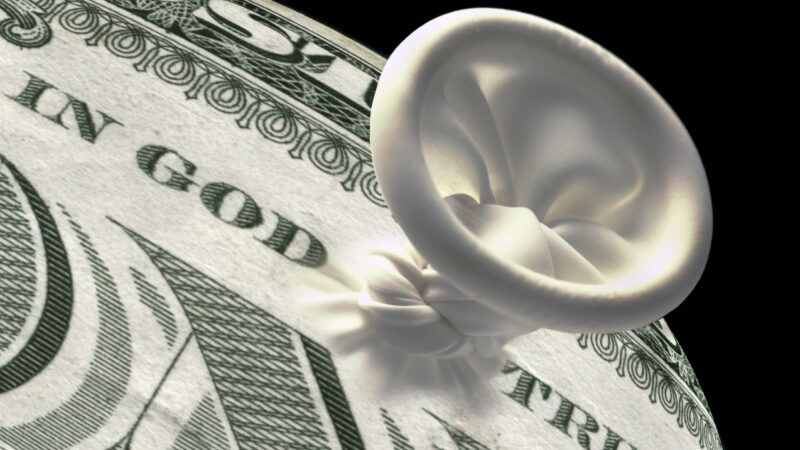Inflation Hits Highest Level Since 1982
Plus: Evidence that redistricting reforms are working to prevent extreme gerrymandering, what Squid Game has to say about communism, and more...

Prices are rising faster than they have in nearly 40 years, as year-over-year inflation hit 6.8 percent in November.
Government data released Friday morning show the highest rate of inflation since 1982, and prices seem to be accelerating rather than cooling off or proving to be "transitory." November is the sixth consecutive month in which prices have been more than 5 percent higher than they were a year ago.
Inflation is hitting just about every category of consumer spending, but some areas are notably worse than 2020 levels. Energy prices are up 33 percent since last year, and prices for used cars continue to soar—31 percent higher than a year ago. Prices for food and clothing have increased by about 6 percent and 5 percent, respectively.
Wow.
It's pretty wild that "food at home" (aka groceries) is now seeing faster price increases (6.4% in past year) than "food away" (aka restaurants, where prices are up 5.8% in past year) pic.twitter.com/c6yBSBekVS
— Heather Long (@byHeatherLong) December 10, 2021
Those rising prices are rippling through every part of the economy. A survey conducted by The Wall Street Journal last month found that 60 percent of small-business owners had increased prices in the past 90 days, while 80 percent reported increasing labor costs and 72 percent said their suppliers had increased prices.
"Fed officials have become increasingly concerned about price increases—both because the uptick has lasted longer than expected and because it shows signs of broadening to areas less affected by the pandemic," The New York Times reports.
Jerome Powell, chair of the Federal Reserve, warned last week that "the risk of higher inflation has increased." He also signaled that the central bank could begin raising interest rates in the coming months if inflation continues unabated. Friday's news will likely put more pressure on the Federal Reserve to do exactly that—because higher interest rates encourage saving and help cool off inflation.
It turns out to be much easier to dump trillions of dollars into the economy than it is to control what happens after you do.
Inflation is always and everywhere a monetary phenomenon. If there is too much cash chasing too few goods, prices will rise. https://t.co/KEu6UvdEeZ
— Megan McArdle (@asymmetricinfo) December 10, 2021
Despite the ridiculous talking points being pushed by some political commentators, there is no objective reason to believe that inflation is more of a problem for the wealthy. Indeed, rising prices for food, fuel, rent, and other basic necessities are already squeezing working-class Americans' budgets and will continue to do that.
And it probably means the end of 99-cent slices of pizza too.
FREE MINDS
More evidence that redistricting reforms implemented during the past decade are working to limit the most extreme forms of partisan gerrymandering:
By our estimate, neutral/commission maps in the blue states of CA, CO, NJ, VA and WA (93 seats total) will end up costing Dems 10-15 House seats they could have seized by gerrymandering, making Republicans even stronger favorites for House control. https://t.co/B6pIvVChXf
— Dave Wasserman (@Redistrict) December 9, 2021
Wasserman's tweet makes it sound like those reforms are specifically harming Democrats, but that's only half true. The changes in states like California and Virginia were implemented to limit gerrymandering by both parties. It just so happens that Democrats are trying to do it in a lot of places this time around.
FREE MARKETS
Mega-hit Netflix show Squid Game is commonly seen as a devastating commentary on modern capitalism. But the show actually has more to say about the problems of communism, argues Reason's Zach Weissmueller:
QUICK HITS
• Congress held yet another performative hearing about Big Tech and it went about the way you'd expect:
19/ Greenblatt: "platforms are engaging in "incitement by algorithm."
What? Ok but that is not how it works.
— Ari Cohn (@AriCohn) December 9, 2021
• Actor Jussie Smollett was convicted of falsely reporting a hate crime, hopefully bringing an end to one of the dumbest legal sagas in American history.
• Great Britain is bracing for a rough winter as the omicron variant threatens to shutter parts of the economy.
• After encouraging restaurants to open up outdoor dining space, San Francisco is rolling out 60 pages of new rules for renewing those permits:
You: a struggling restaurant owner who wants to offer outdoor dining to customers amid an ongoing pandemic.
The city of San Francisco: https://t.co/spGR4sklvU pic.twitter.com/DZpOWEsbZ2
— Conor Friedersdorf (@conor64) December 7, 2021
• A few decades after banning families from having multiple kids, China is now banning vasectomies in the hopes of raising birth rates.
• WikiLeaks founder Julian Assange is one step closer to being extradited to the United States.
• Weekend read: The New Yorker's profile of Enes Kanter Freedom, the Boston Celtics center who has become the sports world's most outspoken China critic.


Show Comments (439)